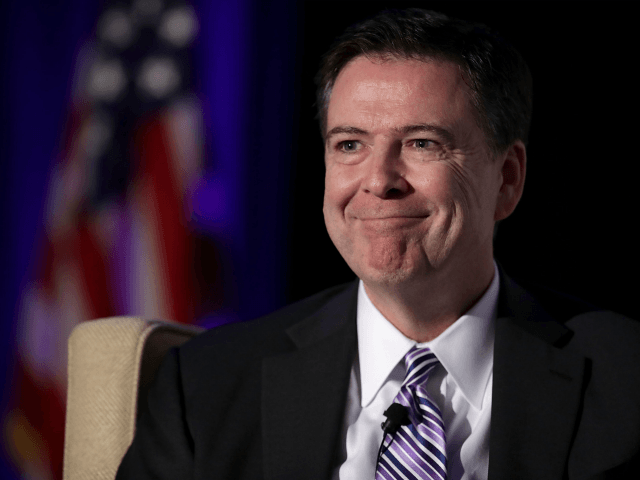Former FBI Director James Comey stated in an interview that he has “struggled” his whole life with his “ego and– and a sense that I– I have to be careful not to fall in love with my own view of things.”
Comey addressed his self-described ego-centric tendencies in an exclusive interview with ABC News’ chief anchor George Stephanopoulos ahead of the release of his memoir on Tuesday.
Asked about this negative traits, Comey conceded that “my rap on myself is that– is that ego focus. That I– since I was a kid, I’ve had a sense of confidence. That I know I’m good at certain things. And there’s a danger that that will bleed over into pride, into not being open minded to the fact that I could be wrong and other people could have a better view of it.”
During the interview, Comey further stated he originally thought he would never write a book because authoring a memoir “always felt like an exercise in ego.”
“And one of the things I’ve struggled with my whole life is my ego and– and a sense that I– I have to be careful not to fall in love with my own view of things,” he added. “And so that battle with ego and my sense that memoirs are an exercise in ego convinced me I was never going to write a book.”
Comey claims he wrote the book out of a sense of duty to the U.S.
Stephanopoulos asked the former FBI chief whether his ego got the best of him when he infamously violated FBI tradition and bypassed the Justice Department to unilaterally make public pronouncements about Hillary Clinton’s email case. Comey did this at a news conference on July 5, 2016 at which he criticized Clinton’s private email server as “extremely careless” before finally stating that “no charges are appropriate in this case.”
“Your critics say this is where your ego got the best of you. This was your original sin?” Stephanopoulos asked.
Comey replied:
Yeah, I hear that. And, look, there’s always a risk that I’m blind to how I’m acting. I don’t think so. I knew this would be terrible for me personally. So if it was about ego, why would I step out in front of the organization and get shot a thousand times?
I actually thought, as bad as this’ll be for me personally, this is my obligation, to protect the F.B.I. and the Justice Department. Given all that had gone on, the attorney general of the United States could not credibly announce this result. And if she did, it would do corrosive damage to the institutions of justice.
Despite describing struggles with his ego, Comey recounted how he originally relented when Attorney General Loretta Lynch convinced the former FBI director to use the word “matter” instead of “investigation” during public comments about the Clinton probe. This despite the Justice Department knowing the FBI probe was not only an official investigation but a criminal investigation.
Here is a transcript of the exchange where Comey recalls the matter, and admits he should have pushed back against Lynch’s request:
GEORGE STEPHANOPOULOS: She– but– she agreed. But you write that she didn’t want to call it an investigation?
JAMES COMEY: That’s right. She agreed Loretta Lynch I had a great relationship with and still have a lot of respect for. And she said, “I agree. But call it a matter.” And I said, “Why would I do that?” And she said, “Just call it a matter.” And I didn’t know exactly why she was doing that, but I decided in that moment that the whole world would miss the distinction between investigation and matter. And so I dropped it at that point. At my press event, I said– used the term matter, and I was right, the press missed it and said we’d confirmed an investigation.
GEORGE STEPHANOPOULOS: Did– did you think she was doing that to protect Hillary Clinton?
JAMES COMEY: I didn’t know. It worried me. It gave me an uncomfortable feeling because the Clinton campaign, since the matter had come in, the investigation had started in July, had been trying to come up with other words to describe it. They had used “Review” I think, “Security referral,” things like that. And it did worry me that the attorney general’s direction was tracking that effort to avoid using the word “investigation.” And so, to be honest, it gave me a bad feeling. And maybe I should’ve pushed harder in the moment.
GEORGE STEPHANOPOULOS: Yeah, did you push her on it?
JAMES COMEY: I didn’t because I’ve known Loretta for a long time. We worked a case together in the early 1990s. And she’s a very smart person. And if she’d had a reason that I couldn’t see in Justice Department policy or something, she’da given it to me. But her answer, “Just do it,” told me this is an order from the attorney general. So it’s not improper, it’s a little bit off axis from the actual facts. But people are going to miss the distinction. And so I’m not going to fight this new attorney general. This is not going to be our first battle.
GEORGE STEPHANOPOULOS: You think you should have?
JAMES COMEY: Yeah, I probably should have. Given that I respect Loretta, I probably should’ve pushed harder in the moment.
Aaron Klein is Breitbart’s Jerusalem bureau chief and senior investigative reporter. He is a New York Times bestselling author and hosts the popular weekend talk radio program, “Aaron Klein Investigative Radio.” Follow him on Twitter @AaronKleinShow. Follow him on Facebook.
Written with additional research by Joshua Klein.

COMMENTS
Please let us know if you're having issues with commenting.